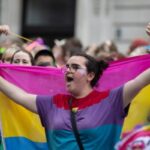We explain what an agender person is and how it differs from traditional genders. Also, other non-binary genders.

What is an agender person?
Someone agender (i.e. “genderless”) is a person who does not identify with any of the existing genders that is, that he does not feel completely male or completely female, or that he feels a little bit of both. To describe this condition, the words “neutral gender”, “null gender”, “white gender” or “empty gender” are often used.
Agenericity, that is, the condition of being of null gender It is part of the gender identities gathered under the conceptual umbrella of non-binary and transgender identities. This means that they group together people of very different backgrounds whose only common element is not feeling identified with the traditional social distinction between men and women, without this having anything to do with their sexual orientation or sexual preferences.
In this way, an agender person prefers not to fully identify with any of the traditional gender roles (man or woman), but that does not necessarily mean that this person feels dissatisfied with their sexuality or their genital anatomy, nor does it mean that they are asexual. (that is, who does not have any defined sexual orientation).
Other non-binary genders
In addition to agender or zero-gender people, there are other gender identities that can be classified as “non-binary”, given that they escape the traditional duality between man and woman, such as:
- fluid gender. Term used for those people who may feel identified with one gender or another in different situations or stages of their life.
- Biggender. Term used for those people who identify with both binary genders at the same time.
- Polygender. Term used for those people who feel identified with multiple genders or who conceive of genders intermediate between the traditional binaries.
Continue with: Cisgender
References
- “Nonbinary gender” on Wikipedia.
- “The glossary of gender” in National Geographic in Spanish.
- “The 8 terms that will help you understand different gender identities” in La Vanguardia.
- “What does it mean to be agender?” at Healthline.





